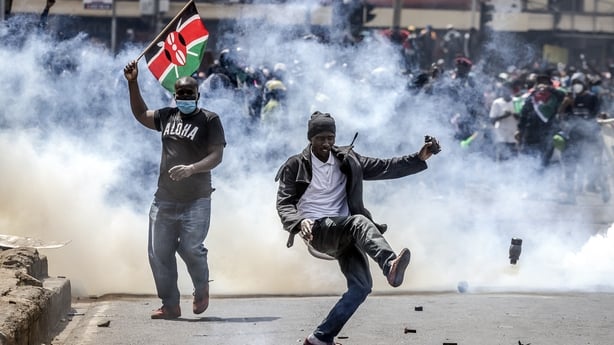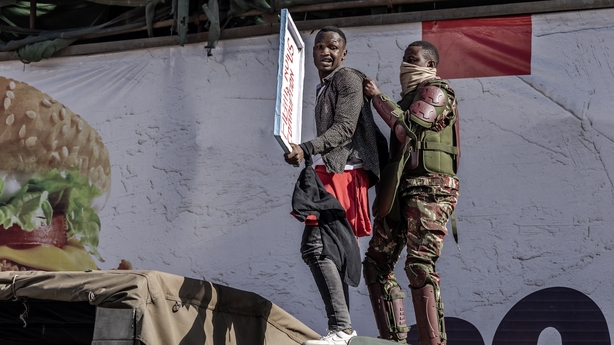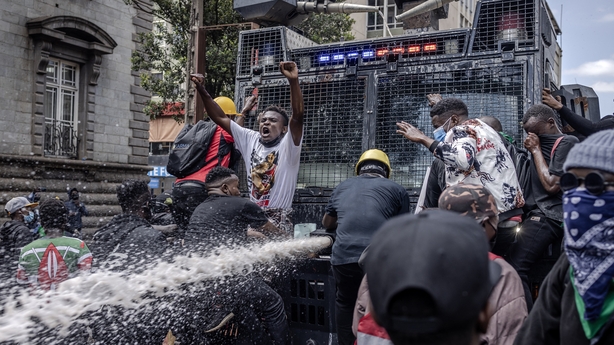Kenya's President William Ruto has promised to take a tough line against "violence and anarchy" after protests over planned tax increases turned deadly and demonstrators ransacked parliament.
"We shall provide a full, effective and expeditious response to today's treasonous events," Mr Ruto said, adding that the demonstrations were "hijacked by dangerous people".
He said the security of Kenyans remains his "utmost priority".
"It is not in order or even conceivable that criminals pretending to be peaceful protesters can reign terror against the people, their elected representatives and the institutions established under our constitution and expect to go scot-free.
"I hereby put on notice the planners, financiers, orchestrators, abetters of violence and anarchy."
Mr Ruto's comments came after police opened fire on crowds trying to storm parliament in the capital Nairobi as politicians debated the legislation.
At least five protesters were killed, dozens wounded and sections of the building set ablaze.
In chaotic scenes, demonstrators overwhelmed police and chased them away as they stormed the parliament building.
Police opened fire after tear gas and water cannon failed to disperse the crowds.
The bodies of at least five protesters were counted by a journalist at the scene.
A paramedic, Vivian Achista, said at least ten people had been shot dead.
Another paramedic, Richard Ngumo, said that more than 50 demonstrators had been wounded by gunfire.
"We want to shut down parliament and every MP should go down and resign," protester Davis Tafari, who was trying to enter parliament, said. "We will have a new government."
There were also protests and clashes in several other cities and towns across Kenya.
Parliament approved the finance bill, which will now be sent to President Ruto for signing.
He can send it back to parliament if he has any objections.
The protesters oppose tax rises in a country already suffering from a cost-of-living crisis, and many are also calling for the president to step down.

Mr Ruto won an election almost two years ago on a platform of championing Kenya's working poor, but has been caught between the competing demands of lenders such as the International Monetary Fund, which is urging the government to cut deficits to access more funding, and a hard-pressed population.
Kenyans have been struggling to cope with several economic shocks caused by the lingering impact of the Covid-19 pandemic, the war in Ukraine, two consecutive years of droughts and depreciation of the currency.
The finance bill aims to raise an additional $2.7 billion (€2.5bn) in taxes as part of an effort to lighten the heavy debt load, with interest payments alone consuming 37% of annual revenue.
The government has made some concessions, promising to scrap proposed new taxes on bread, cooking oil, car ownership and financial transactions. But that has not been enough to satisfy protesters.

Today's demonstrations began in a festival-like atmosphere, but as crowds swelled, police fired tear gas in Nairobi's central business district and the poor neighbourhood of Kibera.
Protesters ducked for cover and threw stones at police lines.
Police also used tear gas in Eldoret, President Ruto's hometown in western Kenya, where crowds filled the streets and many businesses were closed for fear of violence.
Clashes broke out in the coastal city of Mombasa and demonstrations took place in Kisumu, on Lake Victoria, and Garissa in eastern Kenya, where police blocked the main road to Somalia's port of Kismayu.
In Nairobi, people chanted "Ruto must go" and crowds sang in Swahili: "All can be possible without Ruto".
Music played from loudspeakers and protesters waved Kenyan flags and blew whistles in the few hours before the violence escalated.

Thousands of people had taken to the streets of Nairobi and several other cities during two days of protests last week as an online, youth-led movement gathered momentum.
On Sunday, Mr Ruto praised the demonstrators, saying they had been peaceful and that the government would engage with them on the way forward.
But while their anger initially focused on the finance bill, their demands have broadened to demand Mr Ruto's resignation.
The opposition declined to participate in the vote in parliament, shouting "reject, reject" when the house went through the items one by one.
The finance ministry says amendments would blow a 200 billion Kenyan shilling (€1.45bn) hole in the 2024/25budget, and compel the government to make spending cuts or raise taxes elsewhere.
"They are budgeting for corruption," said Hussein Ali, an 18-year-old protester.
"We won't relent. It's the government that is going to back off. Not us."

